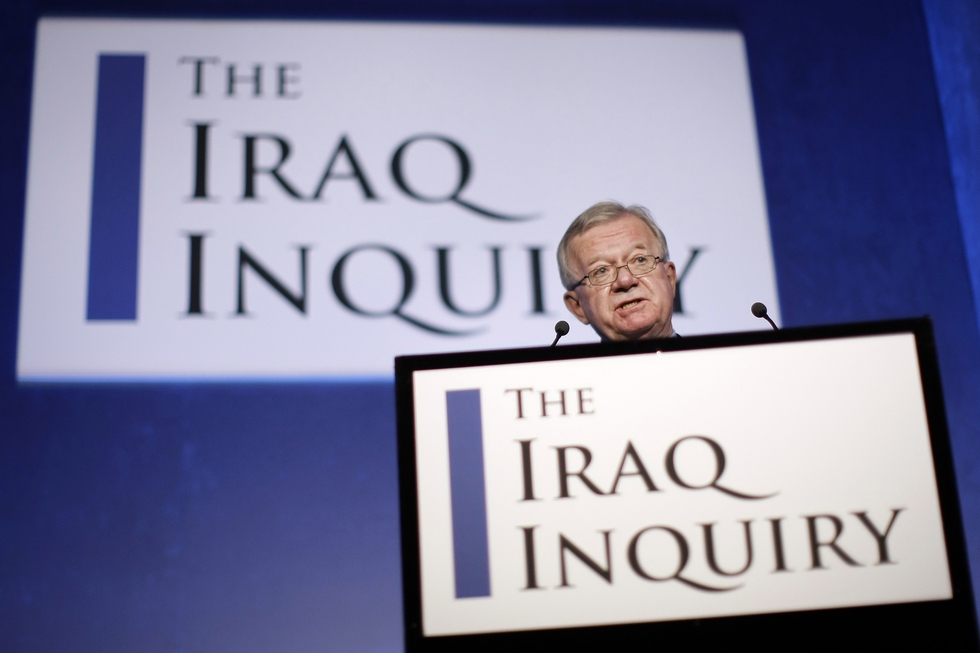LIVE BLOG: Chilcot as it happens

The long-awaited report by Sir John Chilcot, probing why Britain went to war in Iraq and what lessons can be learned, was released on Wednesday.
The report has taken seven years to complete and has cost £10m.
Live Updates
Green MP Caroline Lucas has called Blair a "war criminal" and demanded he be "tried in court" at a Stop the War rally outside the Queen Elizabeth Centre in London.
Philippe Sands QC, an expert in international law, told the BBC:
“Rather like the military planning, the legal planning was found to be unsatisfactory by Chilcot and his team," he said. "It is pretty devastating stuff.”
Sands said that he was initially “concerned about the level of questioning” during the inquiry but that his fears were “misplaced,” calling the report “thorough, fair and balanced”.
He said Blair’s decision to go to war in Iraq was one of “gross recklessness.”
He concluded that his long-time argument that the decision was taken by Blair before informing cabinet was “now established beyond doubt.”
Prime Minister David Cameron tells Parliament that MPs who voted for war in Iraq have to take their "fair share" of the responsibility.
He says that lessons that do need to be learnt include:
- Taking country to war should be the last resort
- Machinery of government is important and that is why we established the 'national security council'
Key quotes from Corbyn's response to David Cameron in Parliament:
- "Invading and occupying Iraq was probably the most significant foreign policy decision this parliament has taken."
- "Iraq was an act of military aggression and deemed illegal according to overwhelming legal opion."
- "The occupation festered a lethal sectarian and led to the catastrophe that exists today."
- "None of us should take any satisfaction in this report"
British Prime Minister David Cameron told Parliament that: "The failures highlighted in this report is not the fault of the military but the planning that took place before a shot was fired."
Author, comedian and long-time Iraq war critic Jeremy Hardy told MEE that he felt Blair was "insane" a "fanatic" and also a "narcissist" who blindly "supported any project the White House would have come up with".
"The fact that the Labour Party is still in awe of this mad man and want [current Labour Party leader] Jeremy Corbyn - who has been entirely vindicated today - to be replaced by someone more like the maniac who unleashed [the war] is extraordinary," he said.
"It is not the way that politics should be decided - big countries deciding to re-order the world for their own whim. We cannot have a world order where big, well-armed, nations just decide who is going to be in power and then change their minds from year to year and kill 100,000s of civilians in the process.
"Blair's god will deal with him - he is lacking any contrition or self-awareness and is zealous - but I think that he probably can't sleep at night. Not because of a sense of contrition but because of his narcissism and the fact that he hasn't come out of this looking like he had hoped. He is a legacy junkie. He wanted to go down in history as a hero and a great figure but he will go down in history as a maniac and that is what upsets him.
The Chilcot report in full.
Rose Gentle, who lost her son Gordon in Iraq told MEE: “Blair lied and Chilcot needs to hold him to account, but I’m afraid the inquiry has dragged on so long that we might not get all the answers we want.”
"No imminent threat from Saddam Hussein in March 2003 and Blair overstated his ability to influence the US"
-Sir John Chilcot
Read our write up of the Iraq Inquiry press conference summarising key findings set out by the Iraq Inquiry.

(Blair visit British troops in Basra in December 2004 AFP)
"The scale of the UK effort in post war Iraq never matched the scale of the challege. The UK most's consistent strategic objective was to reduce the level of its deployed forces."
-Sir John Chilcot
Chilcot sets out potential risks prior to entering Iraq was well established to the British government. Threats included the Al-Qaeda's activity in Iraq and Iranian participation in internal affairs.
Chilcot sets out potential risks that were established prior to entering Iraq was well established to the British government. Threats included the Al-Qaeda's activity in Iraq and Iranian participation in internal affairs.


